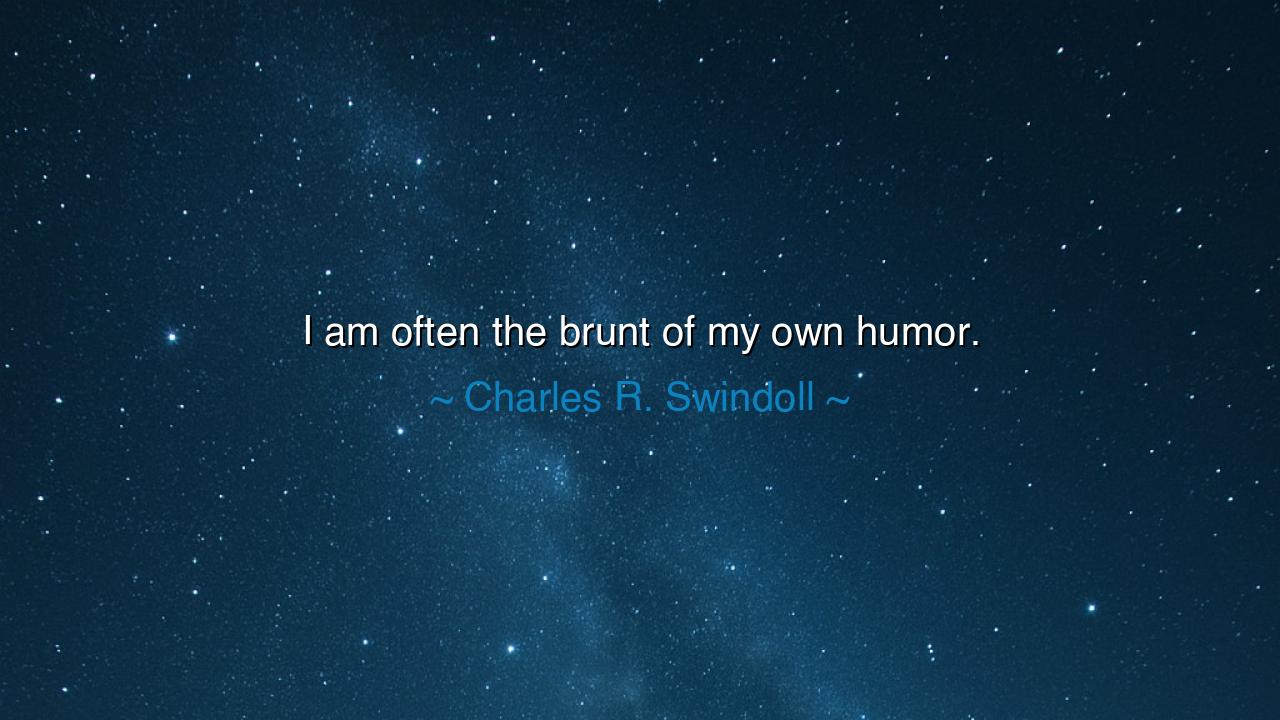
I am often the brunt of my own humor.






When Charles R. Swindoll said, “I am often the brunt of my own humor,” he spoke not merely of jest, but of a profound philosophy of humility and self-awareness. To be the target of one’s own wit is to acknowledge one’s imperfections without shame, to embrace the folly inherent in being human. Swindoll’s words remind us that humor is not only a mirror for others, but a lens through which we may view ourselves — with tenderness, curiosity, and courage. In doing so, laughter becomes a tool not for derision, but for liberation, the balm that softens the edges of ego and pride.
The ancients understood this truth well. The sages of Greece and Rome often mocked themselves before they mocked others, knowing that the first step to wisdom is humility. Socrates, for example, invited scrutiny and mockery of his own ideas, acknowledging his own ignorance as the foundation for learning. To laugh at oneself, as Swindoll describes, is to maintain perspective, to resist the weight of arrogance, and to remain open to growth. It is the laughter of a mind unbound by pretension, the laughter of a soul that has found its center in imperfection.
Being the brunt of one’s own humor is also a form of courage. It requires honesty and self-reflection, for few are willing to expose their flaws to amusement, even their own. Consider Mark Twain, who often made himself the subject of satire in his writings. By highlighting his own contradictions, failures, and foibles, Twain created a bridge between himself and his readers — one built on truth, vulnerability, and empathy. Through self-directed humor, he transformed what might have been shame into connection and insight, reminding us that the greatest laughter is born from recognition, not ridicule.
Swindoll’s approach also reflects a deeper understanding of life’s absurdity. To laugh at oneself is to acknowledge that life is unpredictable, often unjust, and occasionally absurd. By positioning oneself as the target of humor, one practices acceptance — the ability to endure mistakes, missteps, and the relentless trials of existence with grace. Humor becomes a declaration: I see my own flaws, I embrace them, and I will not be broken by them. In this way, laughter strengthens the spirit, rather than diminishes it.
There is a story told of Winston Churchill, whose wit often turned inward. During a particularly grueling session of Parliament, he quipped about his own speech-making style, preemptively laughing at his stumbles. In doing so, he diffused tension, invited camaraderie, and demonstrated resilience. Like Swindoll, Churchill understood that self-directed humor is not weakness, but mastery — it shields the heart from bitterness while opening it to humility, connection, and wisdom.
To be the brunt of one’s own humor is also an act of compassion. By recognizing our own foibles, we cultivate patience and empathy for the imperfections of others. Humor, when turned inward, teaches restraint, kindness, and understanding. It transforms the human experience from a battlefield of judgment into a fellowship of recognition. Those who can laugh at themselves are often the ones most capable of nurturing laughter, joy, and understanding in others.
The lesson, then, is timeless: do not fear exposing your own flaws to laughter. Embrace them, acknowledge them, and see them as the raw material for wisdom. Let your own humor be a teacher, showing you where you are fallible, where you are vulnerable, and where you are human. In doing so, you cultivate resilience, humility, and connection — qualities far more enduring than vanity or pride.
In practical terms, this means practicing self-reflection with levity. When you stumble, smile; when you err, chuckle. Share your mistakes as stories, not confessions of shame. As Charles R. Swindoll teaches, laughter directed at oneself is both medicine and armor, a gentle acknowledgment of imperfection and a declaration that the spirit remains unbroken. By becoming the brunt of your own humor, you turn life’s trials into lessons, its absurdities into joy, and yourself into a master of both humility and resilience.






AAdministratorAdministrator
Welcome, honored guests. Please leave a comment, we will respond soon